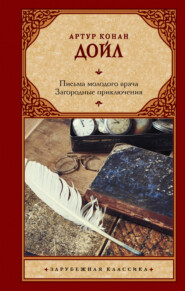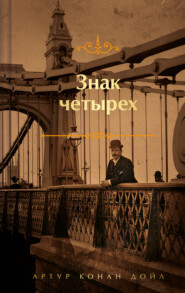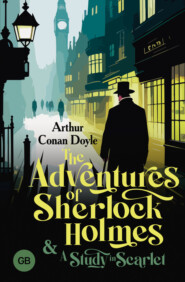По всем вопросам обращайтесь на: info@litportal.ru
(©) 2003-2024.
✖
The Man from Archangel, and Other Tales of Adventure
Настройки чтения
Размер шрифта
Высота строк
Поля
"No, but – "
"You villain!" screamed Pericord. "You thief and villain! You would steal my work! You would filch my credit! I will have that patent back if I have to tear your throat out!" A sombre fire burned in his black eyes, and his hands writhed themselves together with passion. Brown was no coward, but he shrank back as the other advanced upon him.
"Keep your hands off!" he said, drawing a knife from his pocket. "I will defend myself if you attack me.
"You threaten me?" cried Pericord, whose face was livid with anger. "You are a bully as well as a cheat. Will you give up the patent?"
"No, I will not."
"Brown, I say, give it up!"
"I will not. I did the work."
Pericord sprang madly forward with blazing eyes and clutching fingers. His companion writhed out of his grasp, but was dashed against the packing-case, over which he fell. The lamp was extinguished, and the whole barn plunged into darkness. A single ray of moonlight shining through a narrow chink flickered over the great waving fans as they came and went.
"Will you give up the patent, Brown?"
There was no answer.
"Will you give it up?"
Again no answer. Not a sound save the humming and creaking overhead. A cold pang of fear and doubt struck through Pericord's heart. He felt aimlessly about in the dark and his fingers closed upon a hand. It was cold and unresponsive. With all his anger turned to icy horror he struck a match, set the lamp up, and lit it.
Brown lay huddled up on the other side of the packing-case. Pericord seized him in his arms, and with convulsive strength lifted him across. Then the mystery of his silence was explained. He had fallen with his right arm doubled up under him, and his own weight had driven the knife deeply into his body. He had died without a groan. The tragedy had been sudden, horrible, and complete.
Pericord sat silently on the edge of the case, staring blankly down, and shivering like one with the ague, while the great Brown-Pericord Motor boomed and hurtled above him. How long he sat there can never be known. It might have been minutes or it might have been hours. A thousand mad schemes flashed through his dazed brain. It was true that he had been only the indirect cause. But who would believe that? He glanced down at his blood-spattered clothing. Everything was against him. It would be better to fly than to give himself up, relying upon his innocence. No one in London knew where they were. If he could dispose of the body he might have a few days clear before any suspicion would be aroused.
Suddenly a loud crash recalled him to himself. The flying sack had gradually risen with each successive circle until it had struck against the rafters. The blow displaced the connecting-gear, and the machine fell heavily to the ground. Pericord undid the girdle. The motor was uninjured. A sudden, strange thought flashed upon him as he looked at it. The machine had become hateful to him. He might dispose both of it and the body in a way that would baffle all human search.
He threw open the barn door, and carried his companion out into the moonlight. There was a hillock outside, and on the summit of this he laid him reverently down. Then he brought from the barn the motor, the girdle and the flanges. With trembling fingers he fastened the broad steel belt round the dead man's waist. Then he screwed the wings into the sockets. Beneath he slung the motor-box, fastened the wires, and switched on the connection. For a minute or two the huge yellow fans flapped and flickered. Then the body began to move in little jumps down the side of the hillock, gathering a gradual momentum, until at last it heaved up into the air and soared heavily off in the moonlight. He had not used the rudder, but had turned the head for the south. Gradually the weird thing rose higher, and sped faster, until it had passed over the line of cliff, and was sweeping over the silent sea. Pericord watched it with a white drawn face, until it looked like a black bird with golden wings half shrouded in the mist which lay over the waters.
In the New York State Lunatic Asylum there is a wild-eyed man whose name and birth-place are alike unknown. His reason has been unseated by some sudden shock, the doctors say, though of what nature they are unable to determine. "It is the most delicate machine which is most readily put out of gear," they remark, and point, in proof of their axiom, to the complicated electric engines, and remarkable aeronautic machines which the patient is fond of devising in his more lucid moments.
VI
THE SEALED ROOM
A solicitor of an active habit and athletic tastes who is compelled by his hopes of business to remain within the four walls of his office from ten till five must take what exercise he can in the evenings. Hence it was that I was in the habit of indulging in very long nocturnal excursions, in which I sought the heights of Hampstead and Highgate in order to cleanse my system from the impure air of Abchurch Lane. It was in the course of one of these aimless rambles that I first met Felix Stanniford, and so led up to what has been the most extraordinary adventure of my lifetime.
One evening – it was in April or early May of the year 1894 – I made my way to the extreme northern fringe of London, and was walking down one of those fine avenues of high brick villas which the huge city is for ever pushing farther and farther out into the country. It was a fine, clear spring night, the moon was shining out of an unclouded sky, and I, having already left many miles behind me, was inclined to walk slowly and look about me. In this contemplative mood, my attention was arrested by one of the houses which I was passing.
It was a very large building, standing in its own grounds, a little back from the road. It was modern in appearance, and yet it was far less so than its neighbours, all of which were crudely and painfully new. Their symmetrical line was broken by the gap caused by the laurel-studded lawn, with the great, dark, gloomy house looming at the back of it. Evidently it had been the country retreat of some wealthy merchant, built perhaps when the nearest street was a mile off, and now gradually overtaken and surrounded by the red brick tentacles of the London octopus. The next stage, I reflected, would be its digestion and absorption, so that the cheap builder might rear a dozen eighty-pound-a-year villas upon the garden frontage. And then, as all this passed vaguely through my mind, an incident occurred which brought my thoughts into quite another channel.
A four-wheeled cab, that opprobium of London, was coming jolting and creaking in one direction, while in the other there was a yellow glare from the lamp of a cyclist. They were the only moving objects in the whole long, moonlit road, and yet they crashed into each other with that malignant accuracy which brings two ocean liners together in the broad waste of the Atlantic. It was the cyclist's fault. He tried to cross in front of the cab, miscalculated his distance, and was knocked sprawling by the horse's shoulder. He rose, snarling; the cabman swore back at him, and then, realising that his number had not yet been taken, lashed his horse and lumbered off. The cyclist caught at the handles of his prostrate machine, and then suddenly sat down with a groan. "Oh, Lord!" he said.
I ran across the road to his side. "Any harm done?" I asked.
"It's my ankle," said he. "Only a twist, I think; but it's pretty painful. Just give me your hand, will you?"
He lay in the yellow circle of the cycle lamp, and I noted as I helped him to his feet that he was a gentlemanly young fellow, with a slight dark moustache and large, brown eyes, sensitive and nervous in appearance, with indications of weak health upon his sunken cheeks. Work or worry had left its traces upon his thin, yellow face. He stood up when I pulled his hand, but he held one foot in the air, and he groaned as he moved it.
"I can't put it to the ground," said he.
"Where do you live?"
"Here!" he nodded his head towards the big, dark house in the garden. "I was cutting across to the gate when that confounded cab ran into me. Could you help me so far?"
It was easily done. I put his cycle inside the gate, and then I supported him down the drive, and up the steps to the hall door. There was not a light anywhere, and the place was as black and silent as if no one had ever lived in it.
"That will do. Thank you very much," said he, fumbling with his key in the lock.
"No, you must allow me to see you safe."
He made some feeble, petulant protest, and then realised that he could really do nothing without me. The door had opened into a pitch-dark hall. He lurched forward, with my hand still on his arm.
"This door to the right," said he, feeling about in the darkness.
I opened the door, and at the same moment he managed to strike a light. There was a lamp upon the table, and we lit it between us. "Now, I'm all right. You can leave me now! Good-bye!" said he, and with the words he sat down in the arm-chair and fainted dead away.
It was a queer position for me. The fellow looked so ghastly, that really I was not sure that he was not dead. Presently his lips quivered and his breast heaved, but his eyes were two white slits and his colour was horrible. The responsibility was more than I could stand. I pulled at the bell-rope, and heard the bell ringing furiously far away. But no one came in response. The bell tinkled away into silence, which no murmur or movement came to break. I waited, and rang again, with the same result. There must be some one about. This young gentleman could not live all alone in that huge house. His people ought to know of his condition. If they would not answer the bell, I must hunt them out myself. I seized the lamp and rushed from the room.
What I saw outside amazed me. The hall was empty. The stairs were bare, and yellow with dust. There were three doors opening into spacious rooms, and each was uncarpeted and undraped, save for the grey webs which drooped from the cornice, and rosettes of lichen which had formed upon the walls. My feet reverberated in those empty and silent chambers. Then I wandered on down the passage, with the idea that the kitchens, at least, might be tenanted. Some caretaker might lurk in some secluded room. No, they were all equally desolate. Despairing of finding any help, I ran down another corridor, and came on something which surprised me more than ever.
The passage ended in a large, brown door, and the door had a seal of red wax the size of a five-shilling piece over the key-hole. This seal gave me the impression of having been there for a long time, for it was dusty and discoloured. I was still staring at it, and wondering what that door might conceal, when I heard a voice calling behind me, and, running back, found my young man sitting up in his chair and very much astonished at finding himself in darkness.
"Why on earth did you take the lamp away?" he asked.
"I was looking for assistance."
"You might look for some time," said he. "I am alone in the house."
"Awkward if you get an illness."
"It was foolish of me to faint. I inherit a weak heart from my mother, and pain or emotion has that effect upon me. It will carry me off some day, as it did her. You're not a doctor, are you?"
"No, a lawyer. Frank Alder is my name."
"Mine is Felix Stanniford. Funny that I should meet a lawyer, for my friend, Mr. Perceval, was saying that we should need one soon."
"Very happy, I am sure."
"Well, that will depend upon him, you know. Did you say that you had run with that lamp all over the ground floor?"
"Yes."
"All over it?" he asked, with emphasis, and he looked at me very hard.
"I think so. I kept on hoping that I should find some one."
"You villain!" screamed Pericord. "You thief and villain! You would steal my work! You would filch my credit! I will have that patent back if I have to tear your throat out!" A sombre fire burned in his black eyes, and his hands writhed themselves together with passion. Brown was no coward, but he shrank back as the other advanced upon him.
"Keep your hands off!" he said, drawing a knife from his pocket. "I will defend myself if you attack me.
"You threaten me?" cried Pericord, whose face was livid with anger. "You are a bully as well as a cheat. Will you give up the patent?"
"No, I will not."
"Brown, I say, give it up!"
"I will not. I did the work."
Pericord sprang madly forward with blazing eyes and clutching fingers. His companion writhed out of his grasp, but was dashed against the packing-case, over which he fell. The lamp was extinguished, and the whole barn plunged into darkness. A single ray of moonlight shining through a narrow chink flickered over the great waving fans as they came and went.
"Will you give up the patent, Brown?"
There was no answer.
"Will you give it up?"
Again no answer. Not a sound save the humming and creaking overhead. A cold pang of fear and doubt struck through Pericord's heart. He felt aimlessly about in the dark and his fingers closed upon a hand. It was cold and unresponsive. With all his anger turned to icy horror he struck a match, set the lamp up, and lit it.
Brown lay huddled up on the other side of the packing-case. Pericord seized him in his arms, and with convulsive strength lifted him across. Then the mystery of his silence was explained. He had fallen with his right arm doubled up under him, and his own weight had driven the knife deeply into his body. He had died without a groan. The tragedy had been sudden, horrible, and complete.
Pericord sat silently on the edge of the case, staring blankly down, and shivering like one with the ague, while the great Brown-Pericord Motor boomed and hurtled above him. How long he sat there can never be known. It might have been minutes or it might have been hours. A thousand mad schemes flashed through his dazed brain. It was true that he had been only the indirect cause. But who would believe that? He glanced down at his blood-spattered clothing. Everything was against him. It would be better to fly than to give himself up, relying upon his innocence. No one in London knew where they were. If he could dispose of the body he might have a few days clear before any suspicion would be aroused.
Suddenly a loud crash recalled him to himself. The flying sack had gradually risen with each successive circle until it had struck against the rafters. The blow displaced the connecting-gear, and the machine fell heavily to the ground. Pericord undid the girdle. The motor was uninjured. A sudden, strange thought flashed upon him as he looked at it. The machine had become hateful to him. He might dispose both of it and the body in a way that would baffle all human search.
He threw open the barn door, and carried his companion out into the moonlight. There was a hillock outside, and on the summit of this he laid him reverently down. Then he brought from the barn the motor, the girdle and the flanges. With trembling fingers he fastened the broad steel belt round the dead man's waist. Then he screwed the wings into the sockets. Beneath he slung the motor-box, fastened the wires, and switched on the connection. For a minute or two the huge yellow fans flapped and flickered. Then the body began to move in little jumps down the side of the hillock, gathering a gradual momentum, until at last it heaved up into the air and soared heavily off in the moonlight. He had not used the rudder, but had turned the head for the south. Gradually the weird thing rose higher, and sped faster, until it had passed over the line of cliff, and was sweeping over the silent sea. Pericord watched it with a white drawn face, until it looked like a black bird with golden wings half shrouded in the mist which lay over the waters.
In the New York State Lunatic Asylum there is a wild-eyed man whose name and birth-place are alike unknown. His reason has been unseated by some sudden shock, the doctors say, though of what nature they are unable to determine. "It is the most delicate machine which is most readily put out of gear," they remark, and point, in proof of their axiom, to the complicated electric engines, and remarkable aeronautic machines which the patient is fond of devising in his more lucid moments.
VI
THE SEALED ROOM
A solicitor of an active habit and athletic tastes who is compelled by his hopes of business to remain within the four walls of his office from ten till five must take what exercise he can in the evenings. Hence it was that I was in the habit of indulging in very long nocturnal excursions, in which I sought the heights of Hampstead and Highgate in order to cleanse my system from the impure air of Abchurch Lane. It was in the course of one of these aimless rambles that I first met Felix Stanniford, and so led up to what has been the most extraordinary adventure of my lifetime.
One evening – it was in April or early May of the year 1894 – I made my way to the extreme northern fringe of London, and was walking down one of those fine avenues of high brick villas which the huge city is for ever pushing farther and farther out into the country. It was a fine, clear spring night, the moon was shining out of an unclouded sky, and I, having already left many miles behind me, was inclined to walk slowly and look about me. In this contemplative mood, my attention was arrested by one of the houses which I was passing.
It was a very large building, standing in its own grounds, a little back from the road. It was modern in appearance, and yet it was far less so than its neighbours, all of which were crudely and painfully new. Their symmetrical line was broken by the gap caused by the laurel-studded lawn, with the great, dark, gloomy house looming at the back of it. Evidently it had been the country retreat of some wealthy merchant, built perhaps when the nearest street was a mile off, and now gradually overtaken and surrounded by the red brick tentacles of the London octopus. The next stage, I reflected, would be its digestion and absorption, so that the cheap builder might rear a dozen eighty-pound-a-year villas upon the garden frontage. And then, as all this passed vaguely through my mind, an incident occurred which brought my thoughts into quite another channel.
A four-wheeled cab, that opprobium of London, was coming jolting and creaking in one direction, while in the other there was a yellow glare from the lamp of a cyclist. They were the only moving objects in the whole long, moonlit road, and yet they crashed into each other with that malignant accuracy which brings two ocean liners together in the broad waste of the Atlantic. It was the cyclist's fault. He tried to cross in front of the cab, miscalculated his distance, and was knocked sprawling by the horse's shoulder. He rose, snarling; the cabman swore back at him, and then, realising that his number had not yet been taken, lashed his horse and lumbered off. The cyclist caught at the handles of his prostrate machine, and then suddenly sat down with a groan. "Oh, Lord!" he said.
I ran across the road to his side. "Any harm done?" I asked.
"It's my ankle," said he. "Only a twist, I think; but it's pretty painful. Just give me your hand, will you?"
He lay in the yellow circle of the cycle lamp, and I noted as I helped him to his feet that he was a gentlemanly young fellow, with a slight dark moustache and large, brown eyes, sensitive and nervous in appearance, with indications of weak health upon his sunken cheeks. Work or worry had left its traces upon his thin, yellow face. He stood up when I pulled his hand, but he held one foot in the air, and he groaned as he moved it.
"I can't put it to the ground," said he.
"Where do you live?"
"Here!" he nodded his head towards the big, dark house in the garden. "I was cutting across to the gate when that confounded cab ran into me. Could you help me so far?"
It was easily done. I put his cycle inside the gate, and then I supported him down the drive, and up the steps to the hall door. There was not a light anywhere, and the place was as black and silent as if no one had ever lived in it.
"That will do. Thank you very much," said he, fumbling with his key in the lock.
"No, you must allow me to see you safe."
He made some feeble, petulant protest, and then realised that he could really do nothing without me. The door had opened into a pitch-dark hall. He lurched forward, with my hand still on his arm.
"This door to the right," said he, feeling about in the darkness.
I opened the door, and at the same moment he managed to strike a light. There was a lamp upon the table, and we lit it between us. "Now, I'm all right. You can leave me now! Good-bye!" said he, and with the words he sat down in the arm-chair and fainted dead away.
It was a queer position for me. The fellow looked so ghastly, that really I was not sure that he was not dead. Presently his lips quivered and his breast heaved, but his eyes were two white slits and his colour was horrible. The responsibility was more than I could stand. I pulled at the bell-rope, and heard the bell ringing furiously far away. But no one came in response. The bell tinkled away into silence, which no murmur or movement came to break. I waited, and rang again, with the same result. There must be some one about. This young gentleman could not live all alone in that huge house. His people ought to know of his condition. If they would not answer the bell, I must hunt them out myself. I seized the lamp and rushed from the room.
What I saw outside amazed me. The hall was empty. The stairs were bare, and yellow with dust. There were three doors opening into spacious rooms, and each was uncarpeted and undraped, save for the grey webs which drooped from the cornice, and rosettes of lichen which had formed upon the walls. My feet reverberated in those empty and silent chambers. Then I wandered on down the passage, with the idea that the kitchens, at least, might be tenanted. Some caretaker might lurk in some secluded room. No, they were all equally desolate. Despairing of finding any help, I ran down another corridor, and came on something which surprised me more than ever.
The passage ended in a large, brown door, and the door had a seal of red wax the size of a five-shilling piece over the key-hole. This seal gave me the impression of having been there for a long time, for it was dusty and discoloured. I was still staring at it, and wondering what that door might conceal, when I heard a voice calling behind me, and, running back, found my young man sitting up in his chair and very much astonished at finding himself in darkness.
"Why on earth did you take the lamp away?" he asked.
"I was looking for assistance."
"You might look for some time," said he. "I am alone in the house."
"Awkward if you get an illness."
"It was foolish of me to faint. I inherit a weak heart from my mother, and pain or emotion has that effect upon me. It will carry me off some day, as it did her. You're not a doctor, are you?"
"No, a lawyer. Frank Alder is my name."
"Mine is Felix Stanniford. Funny that I should meet a lawyer, for my friend, Mr. Perceval, was saying that we should need one soon."
"Very happy, I am sure."
"Well, that will depend upon him, you know. Did you say that you had run with that lamp all over the ground floor?"
"Yes."
"All over it?" he asked, with emphasis, and he looked at me very hard.
"I think so. I kept on hoping that I should find some one."

















